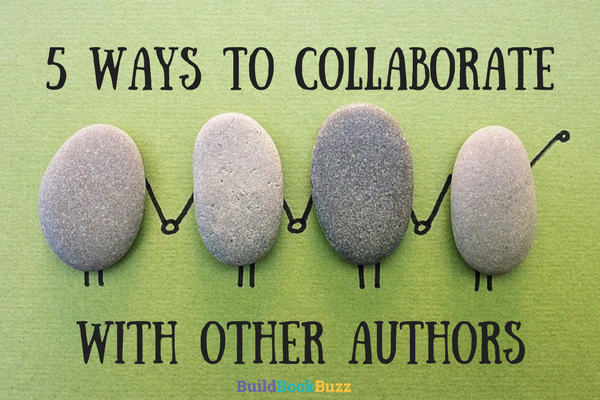5 ways to collaborate with other authors (besides writing a book together)
“Collaborate” is my 2018 business theme.
I’ve got two significant collaborations in the works already. In one case, I’ve teamed up with a colleague to create a training program for authors. In the other, I’m partnering with another writer on a ghostwriting project.
I’m focusing on collaborations this year for a pretty simple reason: This approach can help me go farther faster.
More specifically, collaborations help me:
- Work with a partner who has different skills.
- See situations, problems, and opportunities from someone else’s perspectives.
- Become involved with interesting projects I wouldn’t find on my own.
- Learn and grow.
How might you collaborate?
I’m collaborating to create things, but collaborations can serve many purposes. Authors can collaborate with other authors in a myriad of ways that help all parties move forward.
Here are five ways to work together with other authors to create a win-win situation.
1. Email book news to each other’s email lists.
Find another author in your genre and offer to send book announcements to each other’s mailing lists.
If you have at least 200 names on your list, take this “refer a book” process up a few notches by joining the Books Go Social “Army of Authors” mailing list program. After joining, you’ll occasionally be offered books in your genre to promote to your list. You can decide which ones you do or don’t promote – you have control over that. Participating authors are rewarded.
2. Share beta readers.
Why should two authors in the same genre have to look under rocks to find ready, willing, and able beta readers?
Give each other access to your beta reader networks. Better yet, partner to create a shared group of beta readers you can both turn to when you’re ready for feedback. Make it official with a group name, a sign-up page that details expectations, and a dedicated mailing list you use to share information and offer books.
3. Create and sell an e-book bundle or box set.
Bundles with books from multiple authors sell well on Amazon because they give genre or topic fans an opportunity to “sample” several new authors at a cost that’s less than buying each book individually.
Novelists can collaborate with others in their niche, while nonfiction authors should focus on topics. If you’ve got a collection of Instant Pot recipes, for example, look for other authors with Instant Pot cookbooks. The author of a book about how to write a book might look for authors who have written books on other aspects of publishing, such as self-publishing and marketing.
4. Support each other on social media.
Every once in awhile, one of my most favorite people who just happens to be an author will email me with a request to help her share special news related to one of her books.
It might be a milestone number of reader reviews, a pre-order campaign, or a particularly significant media hit.
I am more than happy to help spread the news in my social networks. I am also comfortable asking her to do the same when I’ve got something that’s bigger than usual to share.
Find a couple of author buddies you can count on to do this for you, too.
5. Review your marketing materials before they’re finalized.
An author friend does this for me. I can’t underestimate the value fresh eyes and a good brain bring to the project.
I often reach a point where I’ve looked at that book description, announcement press release, or landing page so many times that I can’t be objective. Another author can point out missing details, confusing language, or boring text.
Nothing is too small for this review. Swap services for proofreading business cards, evaluating bookmarks or postcards, even checking over Amazon keywords.
Don’t compete, collaborate!
Instead of seeing another author in your niche as a competitor, view that person as a potential collaborator.
Benefits of taking a collaborative, rather than competitive, approach include:
- Reaching more of the right readers than you can on your own.
- Potentially discovering a new way of looking at your topic or genre.
- Reducing author isolation.
These are all good things, right?
Be open to the possibilities that could come your way when you collaborate with other authors.
Looking for someone to partner with? Join the Build Book Buzz Facebook group and post your request there. You might find your ideal collaborator.
How are you collaborating with other authors? Tell us in a comment.
Like what you’re reading? Get it delivered to your inbox every week by subscribing to the free Build Book Buzz newsletter. You’ll also get my free “Top 5 Free Book Promotion Resources” cheat sheet immediately!


Sandy,
Thanks for this great article and the wonderful ideas. As you know we are both active in the American Society of Journalists and Authors. One of the constant little slogans that I’ve heard over the years: “We train our competition.” It is true that on one level we are competitors but actually we are stronger if we cooperate rather than compete. I’ve seen this over and over in the publishing world.
Terry
Straight Talk From the Editor
Thanks, Terry! I agree with you about ASJA — members are particularly good about helping each other learn and grow. It’s impressive.
Sandy
Collaborating is smart, satisfying, and rewarding for all involved. I enjoy supporting fellow authors in many ways, but especially featuring them in a blog post and spreading their news on my social media networks.
As a matter of fact, I’m about to share this post with several of my FB groups.
Thanks for keeping the book biz buzzing.
You’re so good about sharing, Flora! Thank you! Have you considered collaborated in a manner that’s two-way — where it’s some kind of exchange of services or support so that you, too, are getting assistance?
Sandy